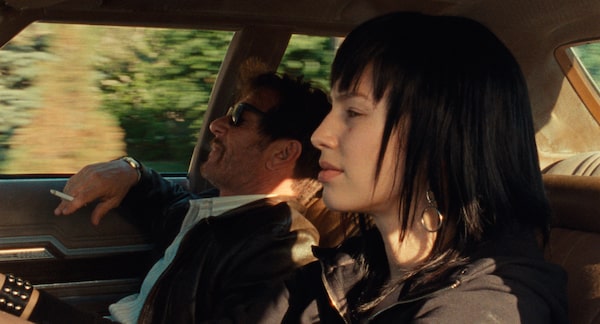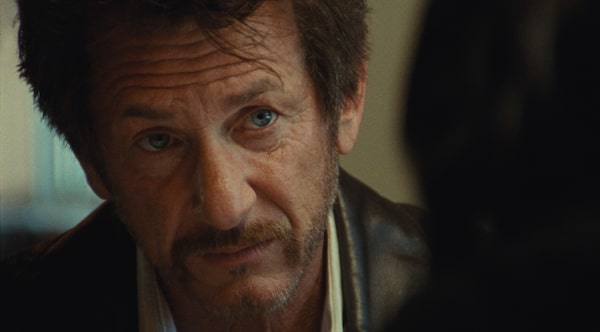Plan your screen time with the weekly What to Watch newsletter. Sign up today.

Sean Penn and his daughter Dylan star in Flag Day.Courtesy of Metro Goldwyn Mayer Pictures Inc./The Associated Press
When he read the script, he saw his daughter’s face. That’s what made Sean Penn want to direct his latest film, Flag Day, and what kept him invested in the project for almost 15 years. It’s why he convinced his daughter, Dylan Penn, now 30, to play the main character, Jennifer Vogel. And it’s why, when the actor he hired to play John Vogel, Jennifer’s father, dropped out a month before they went to camera, Sean stepped in.
It’s the first time Sean acted in a film he directed, and he doesn’t think he’ll do it again. But he savoured “the extraordinary opportunity to play scenes with Dylan, this young woman who I watched grow up, whose face for me was imprinted on the pages of Jez Butterworth’s screenplay,” Sean said in a phone interview from Haiti. He was surveying earthquake damage in remote areas with CORE (Community Organized Relief Effort), the international crisis-response organization he founded. Helicopters buzzed overhead.
Flag Day is based on the real Jennifer Vogel’s 2005 memoir, Flim-Flam Man: The True Story of My Father’s Counterfeit Life. Sean consulted her throughout the process, and she was frequently on set. John was a charismatic charmer, an inveterate liar, and the most notorious counterfeiter in U.S. history. Jennifer saw his flaws but was continually drawn back in by his enthusiasms, and Penn’s film evokes that push/pull cinematically, alternating montages of Jennifer’s memories (which flutter and hover and do look like happiness) with scenes of crushing disappointments, vicious arguments, and sexual assault.
Hard as it was, Sean had to watch his daughter go to dark places. A kitchen fight between Dylan and the Canadian actress who plays Jennifer’s mother – Katheryn Winnick, who holds black belts in tae kwon do and karate – caused very real bruises. “My running joke is that I felt like calling Child Protective Services on myself a few times,” Sean said wryly. But both father and daughter agreed that on set, they were director and actress, period.
Well, mostly. John’s death is telegraphed early in the film, and Sean filmed Dylan’s first reaction to the scene. “He started crying behind the camera – him watching me watching him die,” Dylan recalled in a separate phone interview. (She was also on the road, driving through France with her mother, Robin Wright. I could hear Wright reminding Dylan of anecdotes).

Penn reaches for artistry, and he doesn’t care how weirdly personal many of the attacks against him are.Courtesy of Metro Goldwyn Mayer Pictures Inc./The Associated Press
Dylan’s initial reaction to starring in Flag Day was “No way,” with an expletive added for emphasis. But her goal is to direct, and both of her parents advised that she shouldn’t step foot on a set as director until she knew what it was like to act. Though she was apprehensive about holding her own with Sean – who wouldn’t be? – the minute he called Action on their first scene, “I felt a complete ease come over me,” Dylan said. “He gives so much, so to react to him is incredibly easy. There’s not a false bone in his body.”
Casting himself as the co-lead “liberated me from having to negotiate the normal ego politics of two actors,” Sean said. “I could make sure Jennifer was the focus of the daily work.” They often used two cameras to capture their natural reactions and overlapping dialogue.
“I’m a pretty nuts and bolts actor,” Sean said. “If you’re building a block wall, you know based on pounds per square inch what rebar you need at what separation. I go in with a structural graph of what the story needs. Then, if I get lucky, I add additional colour to go beyond journeyman work.”
Flag Day’s theme of honesty between parents and children felt personal to him. “Kids have an inherent hunger to have their parents share with them authentically,” he said. “As a parent, even though I wasn’t deceptive, I recognized over the years the way I put up guards even with my own children.” (His son Hopper Jack Penn is also in Flag Day, playing Jennifer’s brother). “If I accuse myself of being a truth seeker by nature, there’s plenty of kinks in my armour that made that aspect of Jennifer’s story a parallel of interest.”
Dylan sees another parallel: “Like John, my dad is always up for an adventure,” she said. Her parents took her and her brother to Cuba before the border was open to most U.S. citizens, and they wound up having dinner with Fidel Castro. “I had a passionate debate with Fidel Castro about his homophobia, when I was 12, 13 years old. Who can say that?” Dylan said, laughing. She worries a bit when Sean heads off to a war zone in Afghanistan or meets a violent figure like El Chapo, but she understands that “emergency and danger are kind of his happy place. I think he’s always wanted to be a war journalist. I think acting was his back-burner job.”
She also thinks Sean “is really misunderstood a lot of the time,” Dylan continued. She mentions his relationship with the late Venezuelan president Hugo Chavez, which many critics found controversial. “But Chavez gave my dad’s organization morphine to ship to Haiti,” she said. “So much of what my dad does comes from wanting to learn more, to understand another side..” But Sean doesn’t care that’s he’s misunderstood, so she doesn’t either. “I know who he is,” she said.
Penn reaches for artistry, and he doesn’t care how weirdly personal many of the attacks against him are. The worst reviews of his stream-of-consciousness novel, Bob Honey Who Just Do Stuff (2018), were “the most amusing” to him. He remembers “having drinks and giggle fests, reading them back and forth aloud” with an assistant. He even authorized a full-page ad in The New York Times that quoted only scathing critiques. His favourite: “Sean Penn, shut up. No really, shut up.” The only thing that bothers him is when “everyone who’s worked on a movie of mine gets punished by someone who’s targeting me,” Sean said.
Reactions to Flag Day are mixed, and he does lament that “audiences are increasingly conditioned for that which fits our trending appetites. I recognize that we may be in a time where someone’s appetite to process an individual creative expression is overwhelmed by a tough world, and they want to find escapist fare. I know audiences and critics are dazzled by The Fast and the Furious. I just can’t go there with them.”
Another of Sean’s artistic ambitions for Flag Day: To examine his country’s role in shaping someone like John Vogel. (There is a lot of stars-and-stripes imagery). “Growing up in the US, which I feel really lucky to have done, much of what was promised of what patriotism is, what our country represents, has failed,” Sean said. “That’s becoming a more and more present part of our psyche as a country. Alienation merged with entitlement has led to extremism. We are at a tipping point.”
The father and director in Sean would want me to give the last word to his daughter and star, and fittingly, her answer is about family. “Flag Day is about forgiveness and acceptance,” Dylan said, “and the reconciliation of realizing that your identity is original, it’s yours, but your past and your parents are always going to be part of that.”